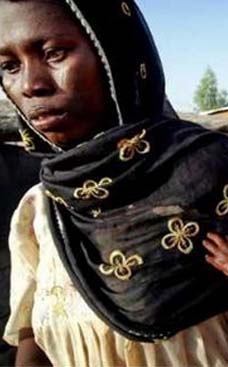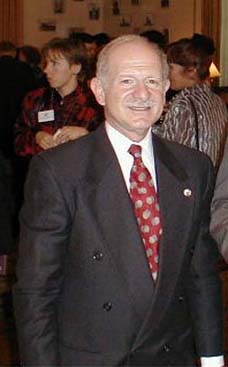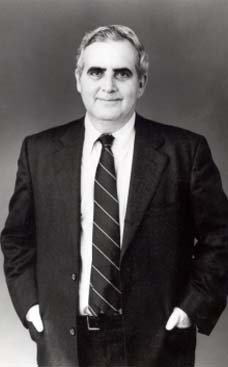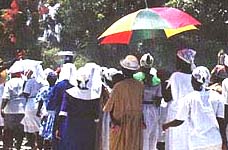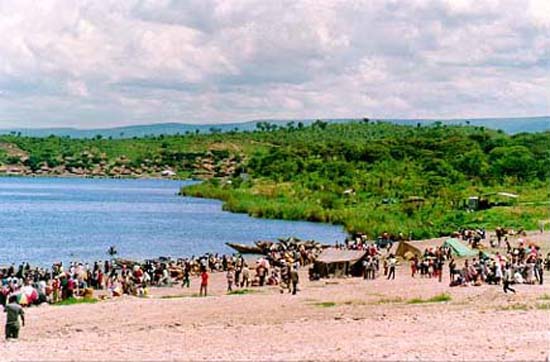
Initially, Cassaniti was not convinced the Peace Corps was for him, and he researched other international volunteer options. He found that many trips required volunteers to pay for their own expenses, and the Peace Corps sounded more appealing after he completed his research.
Jarret Cassaniti served as a Peace Corps Volunteer in Zambia
Out of Africa
By: Olivia Nellums
07/13/2005
Jarret Cassaniti had no idea what he wanted to do when he graduated from the Univeristy of Vermont with an undergraduate degree in anthropology. Eventually, the 1997 Ithaca High School (IHS) graduate did what thousands of other young Americans have done - joined the Peace Corps. Through the e-mail contacts he maintains with friends made in the volunteer program, he has learned that someone named a grandchild after him, and that his successor is struggling with expectations set by Jarret.
But after two years in Africa, he is ready for life's next challenge.
The Decision
After graduating from college in 2001, Cassaniti was determined to use his anthropology degree. He had an interest in Africa from a travel study to the northwest country of Ghana, and "wanted to learn another language, travel and perform community service," he said.
Initially, Cassaniti was not convinced the Peace Corps was for him, and he researched other international volunteer options. He found that many trips required volunteers to pay for their own expenses, and the Peace Corps sounded more appealing after he completed his research.
Established in 1961 by President John F. Kennedy, the mission of the Peace Corps is comprised of three goals: Helping the people of interested countries in meeting their needs for trained men and women; helping promote a better understanding of Americans on the part of the peoples served; and helping promote a better understanding of other peoples on the part of all Americans.
With this in mind, Cassaniti wanted to "learn something and be in a program with experience," he recalled. He felt that the Peace Corps was an organization that knew what it was doing, and he filled out an application to join.
The Experience
Cassaniti chose and was assigned the African continent, to a small village called Buyaka in the southeast country of Zambia. First, he underwent three months of training in language, technology and culture, after which he graduated to volunteer status with a focus on health and HIV/AIDS prevention.
Home to the famous Victoria Falls, and one of the largest producers of copper in the world, Zambia was, until 1964, a British protectorate called Northern Rhodesia. While the official language is English, most of the native people speak Bantu languages. (Bemba was the Bantu language spoken in Cassaniti's village.) Religious beliefs consist mostly of a blend of Christian and native practices, although Cassaniti noticed some Muslims in the eastern and urban parts of the country. Zambia's first multi-party political elections took place in 1991, the same year that the Peace Corps was invited to the country.
Many of the copper mines in Zambia are privatized, and the local citizenry suffers from a variety of diseases including HIV/AIDS as well as poverty. When Cassaniti arrived in Zambia, the Peace Corps provided him with a bike, a water filter, a medical kit and other supplies. Cassaniti's training emphasized preventative health, which addressed malaria, tuberculosis, HIV/AIDS, maternal and reproductive health, child health and nutrition, and water and sanitation.
Cassaniti took direction from both the Zambian government and the Peace Corps, and he found navigating the politics of the two could be tricky. A certain level of independence was expected of him, he explained: The Peace Corps aims "to see what motivated, creative people can do without a lot of money." He had visits from supervisors occasionally, but usually he was left by himself in Buyaka. The nearest health center was eight kilometers (or 4.97 miles) away and had two trained people on staff to serve approximately 6,000 people, he said.
"The first year, I had no idea what was going on," reflected Cassaniti. His initial reaction to being in Zambia was the process of asking, "What am I doing here? Is this for me? Am I accomplishing what I set out to? When am I going home?"
Eventually he acclimated, and although he never became fluent in the local Bemba, "I learned enough to get around, to greet people, to buy food." Cautious about his opinions when recollecting his experiences, "I can tell you what I think," he said.
"Outreach was a big part of my job," he described, as he worked with neighborhood health committees and other groups of native people who wanted to learn what he was teaching. While the schools taught safe practices regarding HIV to the children, educating the adults was an important issue. Some aid agencies bring treatment to those infected with HIV, but "you have to pay for curative treatment," said Cassaniti, and the social stigma attached to having HIV means that many people do not even want to be tested.
"You need to know who has HIV so you can stop the spread and also teach people about it," pointed out Cassaniti. However, he was also torn over the human rights issue of whether he should recommend that people who tested HIV positive should not have sex.
Another challenge that Cassaniti faced was finding locals who wanted to work on health issues. Many villagers thought it was odd that Cassaniti would come from America to be there, particularly when he was unable to provide a quick fix to every one of their problems. The villagers cited other non-governmental organizations (NGOs) that came to Africa with more money and more specific objectives, while Cassaniti's job was "to find out what the people want to do" and to help them achieve those goals from within his specialty.
An additional drawback for Cassaniti was what he saw as many people's attitude of resignation. Every year there was a rainy season, a cold season, a hot season, disease and other worries. "A lot of people thought these things were inevitable," Cassaniti remarked. "There's an immediacy there, and you don't plan ahead of time," because of the attitude that you "could die any day," he said.
But Cassaniti believed he did affect change positively. As an example, he wrote in an e-mail, "People there have a practice of sharing a bowl for washing their hands. Once one person is done, they pass to the next who picks up and deposits their germs for the next and so on and so forth. I always refused to participate in their practice, because I didn't want to get sick and to show them that there are other ways. So instead we would use the pour method for everyone, simply pouring water over ones hands into the bowl, this was also a way of saving a little water. So I noticed people did begin to do that while I was still there, whether it was meant to appease me solely I don't know."
He said: "I really do think that people have benefited in that they are taking a role in their own health."
In Africa, Cassaniti wrestled with the role of money in civil life. While Cassaniti was in Zambia, the Peace Corps experienced budget cuts, and although Cassaniti noticed that inflation rose "around 50 percent in the two years we were there," his wages stayed the same numerically. In addition, when granting financial aid to poor countries, "Do you want to let the people in the urban areas decide how it is distributed even though they don't really know the way the people in the villages really need the money, and also risk all manner and levels of corruption; or do you try and give the money to the villager themselves who are largely also out for themselves and also mostly illiterate and have few technical skills?" Cassaniti asked.
In the face of these complexities, Cassaniti reported that 17 out of 26 people in his group of volunteers filled their full two-year term, and four people in his group stayed for a third year. He admired the people who stayed. "Everyone's incredible who you meet," he said.
At Home, Reflecting
Cassaniti has been home in Ithaca now for approximately two months. Seated at Collegetown Bagels in Ithaca and sipping an iced coffee, it is difficult to believe he was ever living somewhere as exotic as Zambia. But he maintains the relationships he formed in Zambia via e-mail with the help of the female volunteer who took his place in Buyaka and is struggling to meet the expectations set by Cassaniti. "I don't think women are aggressive there. They aren't expected to speak up in community meetings," he said, regarding the difficulties the new volunteer faces.
For the most part, however, "People were happy to have you, happy to see you," he said. They may have been a little confused about why you left America with a car, a family and a house, though, and he remembers trying to communicate that America has its own problems as well.
Cassaniti has a number of new pespectives since his trip, in particular, "Money is not a panacea," he stated. In an e-mail he warned, "Money isn't the thing that will solve any of the problems there alone, there is no magic wand or magic pill for Africa."
"Money management and sustainability are issues just as important. So is skills transfer, that is, teaching some people so that they can transfer the knowledge." Also importantly, "You have to motivate the people to solve their own problems."
He is happy he chose the Peace Corps, as well. "I do think Peace Corps is the cutting edge of development," he said - there is such a thing as inappropriate technology. "You must teach people how to use it themselves," he described, "You can have progress with appropriate technology." For instance, tin roofs for the houses were a kind of status symbol in Buyaka, but the tin was impractical in many ways when compared to traditional straw roofs.
A difficulty in coming back has been adjusting to the faster pace of life and the greater number of rules to abide by. Also, "You're not a rock star here," he smiled, which can be good and bad.
Assessing his experiences, Cassaniti said, "I learned about other food, language, ways of thinking, and to some extent the historical reality that created the situation the people there are in, and to look at things not strictly from my point of view. I learned plenty about myself, not to take things - anything - for granted: food, a job, money, my health, my family's health, etc. I've also definitely become more conscious of things, the politics surrounding a given activity, of all the players involved, their feelings, their opinions and to know that without trying to consider everyone is to risk failing in that endeavor.
"I know that Peace Corps has given me a wider view also to discuss with people global politics and 'development' practices and charity, and since I did spend two years getting my hands dirty I carry a lot more credibility with the people whom I am speaking with despite my young age."
Cassaniti has been surprised at mention of the Peace Corps as a "hippie" organization or a "waste of two years." The only reasons for not having enough to do in the host country might have been "a lack of motivation and an inability to handle the independence," he said.
"I honestly think that now is a great time to join the Peace Corps. Now is a time when people around the world don't really like or understand Americans, and I see the Peace Corps as a way to reach out to all people of the world and show them that among Americans we're not all the same, we're not all what you see in Hollywood movies and on the news," Cassaniti said.
"Certainly not enough Americans have a good idea about Africa. They see disease, war, famine, genocide and poverty, all the bad things. They need to be given a clearer picture about how resilient people are, about how they find joy in their lives and about the good things that are everywhere if you just try to find a little you'll see."
Additional information about the Peace Corps can be found at http://www.peacecorps.gov/index.cfm.
©Ithaca Times 2005







